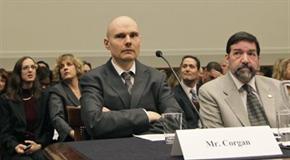Features
Billy Corgan’s Radio Waves
As in royalty fees. Corgan appeared before the House Judiciary Committee in a show of support for the Performance Rights Act, which would force terrestrial radio stations to pay record labels for the music they play, with the royalty payments providing bigger paydays for the performers. Internet and satellite radio stations already pay royalties to labels.

The recording industry, along with artist organization musicFIRST Coalition, began the current campaign for terrestrial radio royalties in 2007. Most, if not all industrialized nations include such payments in their copyright rules & regs, but the United States only requires radio stations to pay royalties to publishers and songwriters.
This isn’t the first time Congress has considered making this change to copyright laws. Congress heard arguments on the issue three times during the last century, most recently in 1981, and decided each time that the labels were not entitled to royalties, ruling that radio stations were exchanging valuable promotional airtime in exchange for music.
Times change, and with the recording industry experiencing serious financial damage from declining CD sales resulting from rampant online piracy, labels and artists are seeking shelter from the storm, partly in the form of radio station royalty payments.
Corgan appeared before the Judiciary Committee as a representative of musicFIRST.
“I was able to find an audience, in no small measure, because of the long support of my music by terrestrial radio,” he said. “I am a big fan of radio, and am very interested in its continued health and well-being. Terrestrial radio has helped me to discover many of the artists that became influential to my life and artistic pursuits. I by no means see them as the bad guy.”
However, while admitting radio had helped him find an audience, Corgan wasn’t about to cut the radio biz any slack. Commenting on radio stations paying publishers but not labels, he said:
“This landmark exemption however stripped performers of their right to a free market evaluation of the value of their recorded works. From my perspective, this issue is one of fundamental fairness. If the performance of a song has value to a particular terrestrial radio station in its airing, I believe it is only right to compensate those performers who have created this work. Simply put, if a station plays a song, both the author and the performer should be paid. These particular performances must have value to the stations or they wouldn’t be playing them.”
There are powerful forces on both sides of this issue. The musicFIRST coalition representing artists, along with the Recording Industry Association of America representing labels, make up a pretty formidable duo fighting for passage of the Performance Rights Act.
Equally formidable are the companies and organizations lining up to defeat the bill, including Clear Channel Communications, CBS Radio and the National Association of Broadcasters, as well as several radio chains. No one wants to pay for something they’ve been getting at no monetary cost, and radio is no exception.
“The real problem, which this bill does not address, is between the artists and the mega-record labels,” Commonwealth Broadcasting President Steven Newberry told the committee, according to radio trade pub Radio & Records. “… If these artists had fair contracts with their labels that included fair royalty clauses, they would have benefited from the promotional value of free radio airplay that they should have enjoyed.”
In deciding this issue, Congress may very well have to define a value, or what it’s worth to record companies and artists when radio stations play music. A single 30-second commercial on a top station in a major market can cost hundreds of dollars, yet music stations devote the lion’s share of their broadcast days playing songs that often clock in at more than three minutes in length. If you’re on the radio industry’s side in this issue, that’s three minutes-plus where a station is “advertising” a particular artist and / or album, free of charge.
If you’re on the side of the labels and artists, you can’t help but notice that radio stations have made billions of dollars over the years due to programming music while those who sing, perform and record the songs, haven’t received a dime in royalties.
It’s not like the old days when FM and AM were music lovers’ only choices for listening to, and discovering music. Piracy has turned the recording industry into a mere shadow of its once-prosperous past. Meanwhile, iPods, Internet radio and satellite radio have cut into terrestrial radio’s audience numbers dramatically.
So something has to give. The NAB is expected to outspend the recording industry by a factor of nearly 5 to 1, according to Bloomberg.
However, the labels still have something the radio industry is lacking – star power. Testimonies like the one delivered by Corgan, as well as past appearances by Lyle Lovett, Don Henley and Judy Collins, often turn congressional committee meetings into media events. While most people may have been unaware of other committee hearings that took place on March 10, they probably heard about Corgan’s appearance, the Performance Rights Act and the argument that radio stations make money off of the backs of artists and labels.
So you could say record companies and artists won the battle this week in the court of public opinion. And it’s a sure bet a few representatives were impressed as well. But can they win the war? That’s the big question.
For Bloomberg’s account, click here.
For Radio & Records account, click here.
For the musicFIRST Coalition Web site, click here.
For the National Association of Broadcasters Web site, click here.